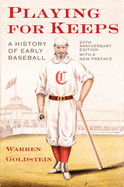Review Quotes:
Goldstein sees clearly that baseball's history is not only linear--that is, its events unfold chronologically--but also cyclical--that is, the same things tend to happen again and again. This repetition binds each generation of fans to the preceding ones and makes the emotional response to the game so intense. In the late 1850s, baseball was a club-based sport enjoyed by artisans, clerks, and shopkeepers who played for fun. Two decades later, it was a business run by owners and managers who employed players in an effort to make a profit. Goldstein analyzes the hows and whys of this transformation. -- "Sporting News"
Rich in delicious information, Playing for Keeps argues that the first years of baseball established patterns of double thinking that still govern the complaints and yearnings of fans. Playing for Keeps tells its story with affection. Its calming long perspective should reassure lovers of the game--or business--as we approach new crises and apparent transformations. -- "New York Times Book Review"
A strikingly original interpretation of baseball's early history, Playing for Keeps is imaginatively conceived and rich in texture. It is not only commendable for its treatment of baseball history but appreciably expands our knowledge of nineteenth-century American urban life in general. -- "Journal of American History"
Baseball remains our paradise lost, a perpetual disappointment, where the best hitters make outs two-thirds of the time and the home team seldom if ever makes it to October. One of the many virtues of Warren Goldstein's Playing for Keeps is that it explains why we continue to care, our hopes eternally and absurdly renewed each spring and dashed each autumn.... This is a marvelous book, tightly structured, entertaining, beautifully written; and, like the best social history, it focuses on the particular (the story of baseball) to enlarge our understanding of the general (American society and culture). -- "The Nation"
